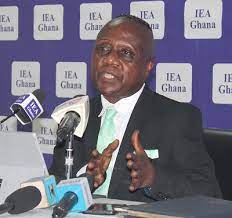
The Institute of Economic Affairs (IEA) is projecting a 200-basis points increase in the policy rate (PR) of the Bank of Ghana (BoG) to 19.0 from 17.0 per cent.
This, it believes, will help narrow the gap with the rising inflation and also ease to some extent the risk of foreign currency outflows.
However, the move will increase the cost of living and doing business because lending rates will go up further, while money supply will reduce.
The MPC will be meeting from today, May 18, 2022 till Friday, May 20, 2022 and developments in the economy expected to be announced alongside a decision on the Policy Rate on May 23, 2022.
The policy rate is the rate at which the BoG, which is the mother of all banks, lends to commercial banks in the country.
The IEA said “going by the principle underlying the Inflation Targeting (IT) with current inflation and future outlook being so elevated, the immediate response by the BoG should be to tighten monetary policy by raising the PR.”
“The obvious question is by how much should the BoG raise the PR? The factors that should determine the PR adjustment include the wide gap between the PR (17.0 per cent) and inflation (23.6 per cent). It cannot take one decision to close this gap, though, given the expected impact on the economy by making credit exorbitantly costly, the policy tightening by major central banks, which increases the risk of foreign currency outflows from developing and emerging market economies and which could put renewed pressure on the cedi,” it argued.
The policy and economic think tank said “taking all of these factors together, it may be surmised that the PR should be raised by another 200 basis points to 19.0 per cent. This will help narrow the gap with inflation and also ease to some extent the risk of foreign currency outflows.”
The adjustment, it said, will also provide some assurance to the markets that the BoG is committed to addressing the resurging inflation, adding, “anything less than this may be interpreted as a weak response, which may be concerning to the markets.”
The IEA also stressed that the Central Bank must buttress its decision with an effective communication strategy to make its intentions clear so that it can rally the markets behind the decision.
“It is known, however, that in the Ghanaian context, the transmission of the PR is constrained by an under-developed and less-responsive financial sector. But even more important is the fact that Ghana has a long history of inflation with strong supply or cost undercurrents, in particular, food, fuel and the exchange rate. Therefore, as an essentially demand-management tool, the IT framework is less suited to Ghana’s type of inflation. It is more suited to mature economies where inflation tends to be more demand-driven,” IEA, said.
The policy and economic think tank urged the BoG to engage with government and relevant agencies to target directly the key sources of inflation pressures, in particular, fuel, food, transport and the exchange rate. It also wants the country to mitigate oil price shocks that may occur due to geopolitical developments.
It urged the government to use some of its windfall earnings from higher oil prices to cushion domestic prices and also suspend or reduce some of the numerous fuel taxes and levies amidst oil shocks. – Myjoyonline.com



